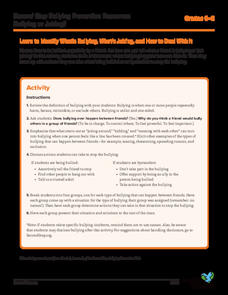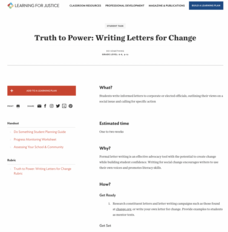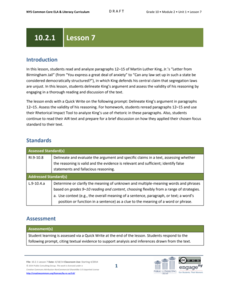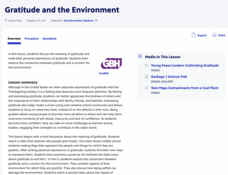EngageNY
Grade 10 ELA Module 4: Unit 2, Lesson 2
What is the best way to determine the theme of a text? Pupils analyze how central ideas emerge in Shakespeare's tragedy Macbeth. They work in small groups and engage in a whole-class discussion to discuss the play's plot. Finally,...
WE Charity
Activity: Exploring the Four Leadership Styles
Mahatma Gandhi, Nelson Mandela, and Mother Teresa were some of the greatest leaders of all time; what made them so great? Scholars discover the qualities of effective leaders using teen leadership activities. Learners complete an...
ProCon
School Vouchers
Do school vouchers for private schools improve public school education, or do they lead to worse academic performance? Scholars read the top four pros and cons to decide if school vouchers are a good idea. They also participate in an...
ProCon
Teacher Tenure
Before the implementation of tenure in 1886, female teachers were sometimes fired for wearing pants or staying out too late at night. Scholars research the debate topic to decide if teachers should get tenure. They review the history of...
EngageNY
Grade 10 ELA Module 4, Unit 2, Lesson 20
Using the resource, scholars work in small groups to rehearse a selected scene from Shakespeare's Macbeth. Finally, they present their interpretive dramatic readings to a group of peers or the whole class and complete a self-assessment...
EngageNY
Grade 10 ELA Module 4: Unit 3, Lesson 4
According to Machiavelli, a good ruler does whatever it takes. Using the resource, scholars work in small groups to analyze quotes from The Prince and then participate in a whole-class discussion. To finish, pupils select a phrase and...
Radford University
Box-and-Whisker Activity
Think inside the box. Working in small groups, pupils design a study to answer comparing two data sets. Team members collect data and construct box-and-whisker plots and analyze them to prove or disprove their hypothesis. They develop...
US Department of Commerce
Make Data Speak
Data displays are more than just a bunch of numbers. Small groups access census results and create eye-catching data displays. Teams choose a statistic and collect data points for five locations. Classmates present their infographics to...
Committee for Children
Learn to Identify What’s Bullying, What’s Joking, and How to Deal With It
A quick lesson takes a look at the differences between bullying and joking. Through whole-class discussion, scholars identify between the two behaviors and brainstorm actions to take to cease bullying behavior. Small groups share with...
Teaching Tolerance
Truth to Power: Writing Letters for Change
Can letter writing really create social change? Pupils create and mail formal letters addressing a specific organization to promote social change they wish to see. Class members reflect on the process and responses they received in small...
Teaching Tolerance
News Consumers' Bill of Rights and Responsibilities
Believe it or not, people have rights as new consumers. Scholars read PEN America's News Consumers' Bill of Rights and Responsibilities and work in small groups to paraphrase chosen sections of the text. Next, they create and present...
NPR
Teaching Podcasting: Choosing a Topic
Pick a topic, any topic! Working in small groups, scholars choose three topics they think would make interesting podcasts. Next, each group shares their ideas with the class to narrow down their choices.
John F. Kennedy Center
Harriet Tubman: Retelling History Through Dance and Drama
Scholars listen to several pieces of music in preparation for a discussion about how instruments and lyrics convey emotions. With Harriet Tubman as the focus, small groups create an original song or dance. A reflection piece concludes...
Health Smart Virginia
Sporting Behavior
Six small groups perform skits that showcase positive sporting behavior. Actors highlight how players try their best, encourage others, win gracefully, think positively, show respect, and resolve conflict. A class discussion and an Exit...
Overcoming Obstacles
Becoming a Good Friend
A instructional activity focuses on the qualities of a good friend. Scholars discuss how to be a good friend and decorate a hand cutout to represent a high five of friendship. Small groups offer encouragement and give compliments to each...
EngageNY
Grade 10 ELA Module 2: Unit 1, Lesson 7
Scholars read King's "Letter from Birmingham Jail" paragraphs to identify his arguments and reasoning. They discuss their ideas in pairs and small groups, complete a Model Argument Delineation Tool, and respond to a quick writing prompt.
EngageNY
Grade 10 ELA Module 2: Unit 3, Lesson 2
Is good good enough? Scholars examine claims made in a speech by Elanor Roosevelt. Roosevelt claims that people should adopt the Universal Declaration of Human Rights because it is a good document. Readers discuss their ideas in pairs,...
Transforming Education
Social Awareness Strategies
What are the benefits of developing social awareness? Using the resource, readers learn strategies for fostering civil discourse, creating a participatory classroom, and enhancing family involvement. Scholars also take a personality...
EngageNY
Evaluating Sources, Continued: The ONLINE EDUCA Debate 2009 (Part 2 of 10)
Watching videos and playing online games can be educational, but too much screen time has its drawbacks. Pupils watch a video about the topic and write down the claim, reasons, and evidence in support of reduced screen time for children....
PBS
Gratitude and the Environment
A class discussion begins a two-part lesson about gratitude and the environment. In part one, learners watch a video then share their feelings about its most memorable moment. Delving deep into the meaning of gratitude, scholars create...
Teaching Tolerance
Sensible Consumers
Girls like pink and boys like blue. Working in small groups, learners discuss stereotypes about children in advertisements. Then, scholars create their own manifestos about how they plan to respond to the consumer market they see in...
Teaching Tolerance
Constructively Engaging in Digital Communities
Say no to hate speech! Pupils discover the importance of practicing empathy and inclusivity in digital communities and discuss strategies for responding to online hate speech. Then, small groups develop and present class guidelines for...
Children’s Hospital of Philadelphia
Meet the Germs
A lesson introduces scholars to the scientist, Martinus Beijerinck, the person behind virus discovery. Learners research and complete a graphic organizer that showcases the differences between a virus and bacteria. Small groups share...
Nemours KidsHealth
Food Allergies: Grades 6-8
Over two lessons, scholars use articles and discussions to define what a food allergy is and identify the most common food allergens. Small groups prepare a skit showcasing how the body exhibits an allergic reaction. Learners examine...

























